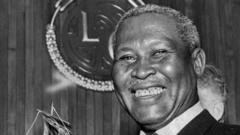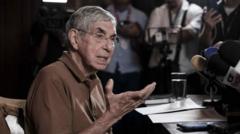Jimmy Carter, the 39th President of the United States and a symbol of resilience and service, passed away at the age of 100. His legacy includes significant foreign policy achievements and a lifelong commitment to humanitarian causes.
The Legacy of Jimmy Carter: A Century of Service and Challenges

The Legacy of Jimmy Carter: A Century of Service and Challenges
Reflecting on Jimmy Carter's life, from his presidency to post-presidential impact, and his journey of humanitarian efforts.
In a poignant tribute to one of the nation’s most enduring figures, Jimmy Carter, who rose from humble beginnings in Georgia to become the 39th President of the United States, passed away at the age of 100, marking the end of a remarkable life spent in public service. Announced by the Carter Center, his death comes on the heels of a long and impactful journey that saw him navigate complex crises both domestically and abroad.
Carter's presidency, which commenced amid the turbulence of Watergate and the Vietnam War, was defined by a commitment to human rights and international peace, most notably illustrated by his role in brokering the Camp David Accords between Israel and Egypt. Despite his best efforts, economic issues, and foreign policy challenges, including the Iran hostage crisis, plagued his single term in office. A staunch advocate for diplomacy, he often emphasized the significance of dialogue, even with adversaries, and worked diligently to establish a legacy that placed human welfare at the forefront of politics.
After leaving the White House, Carter reinvented himself as a global humanitarian by founding the Carter Center, dedicated to eradicating diseases, promoting democracy, and ensuring fair elections worldwide. His work garnered him a Nobel Peace Prize in 2002, solidifying his reputation as a moral leader. Coupled with his commitment to community work, including house-building initiatives for the less fortunate, Carter remained active well into his later years, defying health challenges and earning the respect of not only Democrats but Republicans, who often sought his insights.
Carter's family shared heartfelt messages about his life during recent events, underscoring his profound connection with the American people. Even in his final days, he remained a figure of compassion and resilience, reminding us of his lifelong dedication to fostering peace and goodwill.
In a world rife with discord, the legacy left by Jimmy Carter serves as a poignant reminder of the power of empathy in leadership and the importance of viewing global issues through a lens of humanity. His journey from Plains, Georgia, to the global stage illustrates the profound impact one individual can have through unwavering commitment to service.
Carter's presidency, which commenced amid the turbulence of Watergate and the Vietnam War, was defined by a commitment to human rights and international peace, most notably illustrated by his role in brokering the Camp David Accords between Israel and Egypt. Despite his best efforts, economic issues, and foreign policy challenges, including the Iran hostage crisis, plagued his single term in office. A staunch advocate for diplomacy, he often emphasized the significance of dialogue, even with adversaries, and worked diligently to establish a legacy that placed human welfare at the forefront of politics.
After leaving the White House, Carter reinvented himself as a global humanitarian by founding the Carter Center, dedicated to eradicating diseases, promoting democracy, and ensuring fair elections worldwide. His work garnered him a Nobel Peace Prize in 2002, solidifying his reputation as a moral leader. Coupled with his commitment to community work, including house-building initiatives for the less fortunate, Carter remained active well into his later years, defying health challenges and earning the respect of not only Democrats but Republicans, who often sought his insights.
Carter's family shared heartfelt messages about his life during recent events, underscoring his profound connection with the American people. Even in his final days, he remained a figure of compassion and resilience, reminding us of his lifelong dedication to fostering peace and goodwill.
In a world rife with discord, the legacy left by Jimmy Carter serves as a poignant reminder of the power of empathy in leadership and the importance of viewing global issues through a lens of humanity. His journey from Plains, Georgia, to the global stage illustrates the profound impact one individual can have through unwavering commitment to service.





















